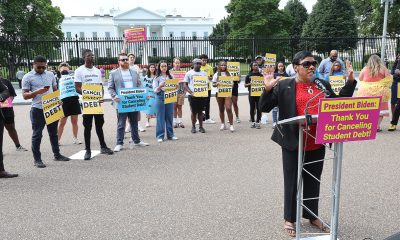Op-Ed
Abusive Lending Practices Target People of Color
By Charlene Crowell
NNPA Columnist
Each year the many forms and products of predatory lending drain at minimum hundreds of billions of dollars from the nation’s economy and communities across the country. Abusive lending imposes high initial costs and ushers in a host of long-term debt for borrowers and communities.
For example, in the subprime mortgage boom, specific abuses added thousands to the price borrowers paid. These abuses also triggered incredible long-term costs. From 2007 to 2012, the housing crisis alone cost the nation $10 trillion and 8.4 million jobs.
New research from the Center for Responsible Lending (CRL) examines how abusive lending has cumulative impacts on consumers, communities and the nation. Released June 16, The State of Lending in America and its Impact on U.S. Households finds that in addition to paying high fees and interest over the long-term, predatory loans and practices force borrowers to forfeit financial opportunities while robbing consumers of economic mobility.
“This report shows how the damage can be compounded, creating a long-term barrier to upward mobility,” wrote Michael Calhoun, CRL president in the report’s foreword. “Responsible lending products can create a critical pathway to economic security, especially for low-and-moderate-income families. ‘Families who lose their home to foreclosure not only forfeit their existing equity, they also lose the opportunity to build savings, since they may be locked out of affordable credit for many years.”
As highlighted in the report, responsible mortgages made during the recent housing crisis to subprime borrowers resulted in an average gain of approximately $20,000 in home equity.
Consumers of color – often Blacks and Latinos – were found to be two to three times more likely to be the target of an abusive lending than White borrowers – whether the product was a subprime mortgage with a pre-payment penalty, a payday loan, an auto loan that had an interest rate marked-up by the dealer or taking on debt for enrollment at a for-profit college.
Additionally, if a borrower has one abusive loan, he or she may be more likely to struggle with other debts. And in some cases, one abusive prompts another as household financial stresses mount.
Among the report’s key findings:
• Fifty-five percent of car-title loan borrowers also have taken out a payday loan;
• One-third of payday loan borrows repaid their loan by overdrawing their checking account and paying an overdraft fee to their bank; and
• One in seven jobseekers with blemished credit has been passed over for employment after a credit check.
“Consumers are not simply mortgage holders, credit card users, or payday loan borrowers – they are likely to participate in more than one market, often at the same time,” said Sarah Wolff, CRL senior researcher and author of the report. For borrowers victimized by predatory practices, the costs are high, compounding and long-lasting. And this is especially troubling when considering that predatory lending disproportionately impacts lower-income families – contributing significantly to the widening of this country’s wealth gap.”
Families devastated by subprime mortgages in the housing crisis are not the only ones affected by predatory lending. Abusive lending tactics, like lenders extending credit without assessing the borrower’s ability to repay, occur on multiple types of loans.
For example, payday loans have interest rates ranging from 391-521 annual percentage rates and are made without assessing ability to repay. In fact, only 25 percent of payday loans are ever retired in a two-week period while 75 percent of payday loan volume results from borrowers re-borrowing every two weeks. Ultimately, half of payday borrowers eventually default and face as a result myriad consequences.
If a bank customer, for example, incurs too many fees for insufficient funds, banks can and often do close these accounts, leaving the former customer to use costly alternative financial services such as check-cashing services, prepaid cards, and more.
In other instances, a payday borrower hoping to finally pay off a payday loan may turn to a car-title loan. By doing so, the payday loan may be finally satisfied; but the high-cost of the car-title loan saddles the borrower with even more debt and puts the borrower at risk of losing his or her personal transportation at a fraction of the value of the vehicle. Even in instances where vehicles are taken by title-loan lenders, the consumer will still owe the balance of the title loan and additional fees related to the repossession. How personal transportation will be managed becomes yet another personal crisis.
In short, every new form of predatory lending leads to greater financial instability, and siphons hard-earned wages from families.
By contrast, responsible lending, says the report, “provides fair, affordable and transparent loans. . . .Just as a hammer can be used to build a house or take it down, lending can help families build wealth or strip it away.”
Charlene Crowell is a communications manager with the Center for Responsible Lending. She can be reached at Charlene.crowell@responsiblelending.org.
###
Commentary
California Respects the Power of Your Vote
As California Secretary of State, I do not take the progress we have made over the years lightly. My staff and I hold sacred the obligation to ensure that our elections are safe, free, fair, and accessible to all. Therefore, before certifying the results for this year’s election on Dec. 13, we have taken a number of steps to ensure that every vote is counted. We have also made sure that our ballot counting process is credible and free from interference.

By Shirley N. Weber, Ph.D.,
California Secretary of State
Californians can confidently claim this: California has made more significant reforms to our election laws and expanded voting rights than any other state.
The relevance of this accomplishment deepens as we prepare to celebrate the 60th anniversary of the Voting Rights Act next year. This landmark legislation began to undo our country’s long history of voter suppression, intimidation, and disenfranchisement that far too many Americans experienced at the polls for decades.
My own parents, who were sharecroppers, were denied their right to vote in the Jim Crow era South. Before moving to Los Angeles from Hope, Arkansas, my parents, David and Mildred Nash, could not vote. My father was an adult with six children before he registered to vote and was only able to exercise that constitutional right for the first time here in California.
As California Secretary of State, I do not take the progress we have made over the years lightly. My staff and I hold sacred the obligation to ensure that our elections are safe, free, fair, and accessible to all.
Therefore, before certifying the results for this year’s election on Dec. 13, we have taken a number of steps to ensure that every vote is counted. We have also made sure that our ballot counting process is credible and free from interference.
To meet that deadline without a hitch, California requires elections officials in all 58 counties to turn in their official results by a certain date. This year, that date was Dec. 6.
By law, every eligible voter in our state receives a vote-by-mail ballot. This ensures all registered voters can exercise their right to vote.
Whether you placed your ballot in a designated drop-off box, voted by mail, or cast your ballot at a polling center, votes are safe and secure. And we allow voters to sign up to receive text message, email, or voice call notifications about the status of their own ballots by using the Where’s My Ballot? tool. To learn more or to sign up, paste this URL in your web browser: https://california.ballottrax.net/voter/
The ballots of Californians who voted by mail are also protected. The United States Postal Service partners with the State to make sure ballots are delivered on time. All mailed-in ballots are sent by First Class mail with a postage paid envelope provided to every eligible registered voter.
Election Security is our No. 1 priority. That’s why my office designed and implemented a program to back up that commitment. For more information, visit this URL: https://www.sos.ca.gov/elections/election-cybersecurity
Additionally, California takes preventive actions to make sure our voting technology keeps our elections safe and protects everyone’s votes.
For example, county voting systems are not connected to the internet, which protects them from cyberthreats. The State also performs regular and rigorous testing to make sure the voting systems are working optimally, and only authorized personnel are granted access.
Staff members are also given phishing and cybersecurity training.
VoteCal, the state’s centralized voter registration system, is also key. The system is regularly updated, and it is used as a resource for counties to verify voter signatures.
California also provides security at all counting locations and makes sure ballot drop-off boxes are secured and monitored.
And all election processes are open to observation during specified hours.
In my role as Secretary of State of California, there is nothing more important to me than defending our democracy.
I am committed to safeguarding voting rights, and to leading our state in upholding the highest democratic standards by implementing policies and practices that Californians and all Americans can trust and look to for instruction and hope.
You can contact the California Office of the Secretary of State at 1-800-345-Vote or elections@sos.ca.gov with inquiries or to report suspected incidents or irregularities. Additional information can be found at www.sos.ca.gov and the office’s social media platforms:
Instagram: @californiasos_
Facebook: Facebook.com/CaliforniaSOS
X: @CASOSVote
Activism
COMMENTARY: PEN Oakland Entices: When the News is Bad, Try Poetry
Strongman politics is not for the weak. Here in the U.S., Donald Trump is testing how strongman politics could work in the world’s model democracy.

By Emil Guillermo
As the world falls apart, you need more poetry in your life.
I was convinced on Tuesday when a weak and unpopular president of South Korea — a free nation U.S. ally — tried to save himself by declaring martial law.
Was it a stunt? Maybe. But indicative of the South Korean president’s weakness, almost immediately, the parliament there voted down his declaration.
The takeaway: in politics, nothing quite works like it used to.
Strongman politics is not for the weak. Here in the U.S., Donald Trump is testing how strongman politics could work in the world’s model democracy.
Right now, we need more than a prayer.
NEWS ANTIDOTE? LITERATURE
As we prepare for another Trump administration, my advice: Take a deep breath, and read more poetry, essays and novels.
From “Poetry, Essays and Novels,” the acronym PEN is derived.
Which ones to read?
Register (tickets are limited) to join Tennessee Reed and myself as we host PEN OAKLAND’s award ceremony this Saturday on Zoom, in association with the Oakland Public Library.
Find out about what’s worth a read from local artists and writers like Cheryl Fabio, Jack Foley, Maw Shein Win, and Lucille Lang Day.
Hear from award winning writers like Henry Threadgill, Brent Hayes Edwards and Airea D. Matthews.
PEN Oakland is the local branch of the national PEN. Co-founded by the renowned Oakland writer, playwright, poet and novelist Ishmael Reed, Oakland PEN is special because it is a leader in fighting to include multicultural voices.
Reed is still writing. So is his wife Carla Blank, whose title essay in the new book, “A Jew in Ramallah, And Other Essays,” (Baraka Books), provides an artist’s perspective on the conflict in Gaza.
Of all Reed’s work, it’s his poetry that I’ve found the most musical and inspiring.
It’s made me start writing and enjoying poetry more intentionally. This year, I was named poet laureate of my small San Joaquin rural town.
Now as a member of Oakland PEN, I can say, yes, I have written poetry and essays, but not a novel. One man shows I’ve written, so I have my own sub-group. My acronym: Oakland PEOMS.
Reed’s most recent book of poetry, “Why the Black Hole Sings the Blues, Poems 2007-2020” is one of my favorites. One poem especially captures the emerging xenophobia of the day. I offer you the first stanza of “The Banishment.”
We don’t want you here
Your crops grow better than ours
We don’t want you here
You’re not one of our kind
We’ll drive you out
As thou you were never here
Your names, family, and history
We’ll make them all disappear.
There’s more. But that stanza captures the anxiety many of us feel from the threat of mass deportations. The poem was written more than four years ago during the first Trump administration.
We’ve lived through all this before. And survived.
The news sometimes lulls us into acquiescence, but poetry strikes at the heart and forces us to see and feel more clearly.
About the Author
Emil Guillermo is a journalist and commentator. Join him at www.patreon.com/emilamok
Bay Area
In the City Attorney Race, Ryan Richardson Is Better for Oakland
It’s been two years since negotiations broke down between the City of Oakland and a developer who wants to build a coal terminal here, and the issue has reappeared, quietly, in the upcoming race for Oakland City attorney. Two candidates are running for the position of Oakland City Attorney in November: current Assistant Chief City Attorney Ryan Richardson and retired judge Brenda Harbin-Forte.

By Margaret Rossoff
Special to The Post
OPINION
It’s been two years since negotiations broke down between the City of Oakland and a developer who wants to build a coal terminal here, and the issue has reappeared, quietly, in the upcoming race for Oakland City attorney.
Two candidates are running for the position of Oakland City Attorney in November: current Assistant Chief City Attorney Ryan Richardson and retired judge Brenda Harbin-Forte.
Richardson has worked in the Office of the City Attorney since 2014 and is likely to continue current City Attorney Barbara Parker’s policies managing the department. He has committed not to accept campaign contributions from developers who want to store and handle coal at a proposed marine terminal in Oakland.
Retired Judge Harbin-Forte launched and has played a leading role in the campaign to recall Mayor Sheng Thao, which is also on the November ballot. She has stepped back from the recall campaign to focus on her candidacy. The East Bay Times noted, “Harbin-Forte’s decision to lead the recall campaign against a potential future client is … troubling — and is likely to undermine her ability, if she were to win, to work effectively.”
Harbin-Forte has refused to rule out accepting campaign support from coal terminal interests or their agents. Coal terminal lobbyist Greg McConnell’s Independent Expenditure Committee “SOS Oakland” is backing her campaign.
In the 2022 mayor’s race, parties hoping to build a coal terminal made $600,000 in contributions to another of McConnell’s Independent Expenditure Committees.
In a recent interview, Harbin-Forte said she is open to “listening to both sides” and will be “fair.” However, the City Attorney’s job is not to judge fairly between the City and its legal opponents – it is to represent the City against its opponents.
She thought that the 2022 settlement negotiations ended because the City “rejected a ‘no coal’ settlement.” This is lobbyist McConnell’s narrative, in contrast to the report by City Attorney Barbara Parker. Parker has explained that the City continued to negotiate in good faith for a settlement with no “loopholes” that could have allowed coal to ship through Oakland – until would-be coal developer Phil Tagami broke off negotiations.
One of Harbin-Forte’s main priorities, listed on her website, is “reducing reliance on outside law firms,” and instead use the lawyers working in the City Attorney’s office.
However, sometimes this office doesn’t have the extensive expertise available that outside firms can provide in major litigation. In the ongoing, high stakes coal litigation, the City has benefited from collaborating with experienced, specialized attorneys who could take on the nationally prominent firms representing the City’s opponents.
The City will continue to need this expertise as it pursues an appeal of the judge’s decision that restored the developer’s lease and defends against a billion-dollar lawsuit brought by the hedge fund operator who holds the sublease on the property.
Harbin-Forte’s unwillingness to refuse campaign contributions from coal terminal interests, her opposition to using outside resources when needed, as well as her uncritical repetition of coal lobbyist McConnell’s claim that the City sabotaged the settlement talks of 2022 all raise serious concerns about how well she would represent the best interests of Oakland and Oaklanders if she is elected City Attorney.
-

 Activism4 weeks ago
Activism4 weeks agoOakland Post: Week of November 27 – December 3, 2024
-

 Activism2 weeks ago
Activism2 weeks agoButler, Lee Celebrate Passage of Bill to Honor Congresswoman Shirley Chisholm with Congressional Gold Medal
-

 Activism2 weeks ago
Activism2 weeks agoPost News Group to Host Second Town Hall on Racism, Hate Crimes
-

 Activism2 weeks ago
Activism2 weeks agoDelta Sigma Theta Alumnae Chapters Host World AIDS Day Event
-

 Business2 weeks ago
Business2 weeks agoLandlords Are Using AI to Raise Rents — And California Cities Are Leading the Pushback
-

 Activism3 weeks ago
Activism3 weeks agoOakland Post: Week of December 4 – 10, 2024
-

 Arts and Culture1 week ago
Arts and Culture1 week agoPromise Marks Performs Songs of Etta James in One-Woman Show, “A Sunday Kind of Love” at the Black Repertory Theater in Berkeley
-

 Activism2 weeks ago
Activism2 weeks agoOakland Post: Week of December 11 – 17, 2024






























































